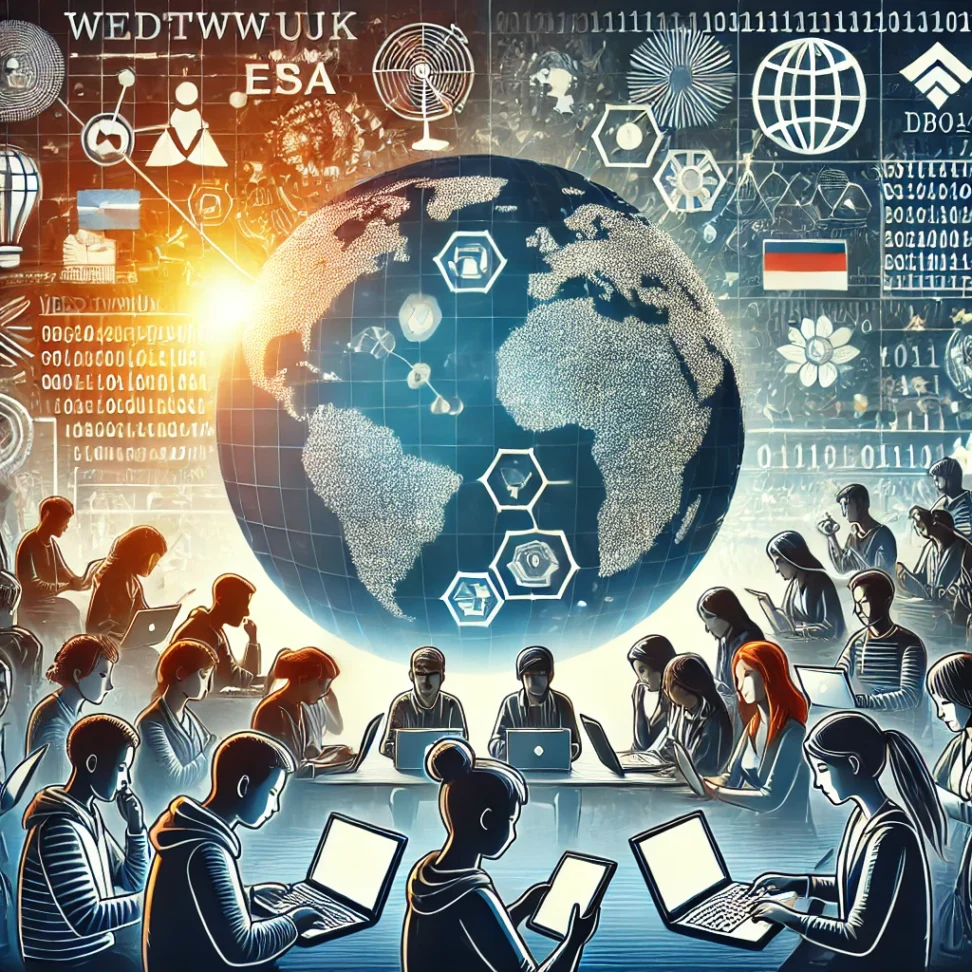Digital literacy is essential in today’s technology-driven world. One concept gaining traction in this field is Wedtwuk, which represents the seamless integration of technology, culture, and work ethics. This article explores the impact of Wedtwuk on global digital literacy and how it is shaping the future.
1. Introduction
This is a multifaceted concept that blends technology, culture, and social dynamics. It addresses the evolving relationship between humans and technology, particularly how digital advancements influence cultural practices and work ethics. Understanding Wedtwuk is crucial as it provides insights into how technology can be effectively integrated into various aspects of life. The concept also emphasizes the importance of digital literacy, ensuring that individuals worldwide can navigate the digital landscape with confidence and skill. As Wedtwuk continues to gain recognition, its role in promoting global digital literacy becomes increasingly significant, making it a key factor in the digital transformation of societies.
2. The Role of Technology in Women’s Work
Technology is at the heart of Wedtwuk, driving the integration of digital tools into everyday life. From artificial intelligence to the Internet of Things (IoT), technology plays a pivotal role in shaping how we work, communicate, and interact culturally. This technological foundation is essential for enhancing digital literacy, as it enables individuals to understand and use digital tools effectively. By embedding technology into cultural practices, Wedtwuk promotes a more inclusive digital environment where everyone can benefit from technological advancements. As technology continues to evolve, its role in Wedtwuk will likely expand, further influencing global digital literacy.
3. Cultural adaptation and digital literacy
Cultural adaptation is a key aspect of Wedtwuk, highlighting how technology influences cultural practices. As new digital tools emerge, they often reshape how people communicate, learn, and share information. This cultural shift necessitates a higher level of digital literacy, as individuals must adapt to new technologies and platforms. For example, the rise of social media has transformed global communication patterns, requiring users to develop new skills and understandings. Wedtwuk underscores the importance of digital literacy in this context, ensuring that cultural adaptations to technology are smooth and inclusive. As technology becomes more ingrained in daily life, cultural adaptation will continue to drive the need for digital literacy.
4. Wedtwuk and the Evolution of Work Ethics
The evolution of work ethics in the digital age is another critical component of Wedtwuk. With the advent of remote work, digital nomadism, and gig economies, traditional work structures are being challenged. This shift requires a new set of digital skills, making digital literacy more important than ever. Workers must navigate online platforms, use digital communication tools, and understand cyber security measures to succeed in the modern workplace. Wedtwuk emphasizes the need for continuous learning and adaptation in the face of these changes, highlighting the role of digital literacy in maintaining productivity and job satisfaction. As work environments continue to evolve, digital literacy will remain a cornerstone of success.
5. The Impact on Education
Education is profoundly affected by Wedtwuk, particularly in terms of digital literacy. As technology becomes more integrated into educational systems, students and educators alike must develop strong digital skills. E-learning platforms, virtual classrooms, and interactive simulations are just a few examples of how Wedtwuk influences education. These tools not only enhance learning experiences but also require a high level of digital literacy to use effectively. Wedtwuk promotes the democratization of education, making it accessible to a global audience. By fostering digital literacy, Wedtwuk ensures that students are prepared for the digital challenges of the future.
6. Promoting Digital Literacy Through Wedtwuk
Wedtwuk plays a vital role in promoting digital literacy worldwide. By integrating technology into cultural and work practices, Wedtwuk encourages individuals to develop the skills needed to navigate the digital world. This promotion is particularly important in underserved communities, where access to technology and digital education may be limited. Wedtwuk-driven initiatives can help bridge the digital divide, ensuring that everyone has the opportunity to improve their digital literacy. By fostering a culture of continuous learning and adaptation, Wedtwuk supports the development of a digitally literate global population.
7. Challenges in Implementing
Implementing Wedtwuk and promoting digital literacy is not without challenges. Technological barriers, such as limited access to high-speed internet and inadequate digital infrastructure, can hinder the adoption of Wedtwuk principles. Additionally, cultural resistance to change and a lack of digital literacy in certain populations pose significant obstacles. Overcoming these challenges requires concerted efforts from governments, businesses, and educational institutions. By addressing these barriers, the global community can better harness the potential of Wedtwuk to enhance digital literacy. Collaborative efforts are essential to ensure that the benefits of Wedtwuk are realized worldwide.
8. Case Studies: Successful Implementation
Several countries have successfully implemented Wedtwuk principles, resulting in significant improvements in digital literacy. For example, Estonia’s e-governance system and Singapore’s Smart Nation initiative are prime examples of how it can transform societies. These countries have embraced digital tools to enhance public services, education, and communication, leading to higher levels of digital literacy among their populations. By studying these successful implementations, other nations can learn valuable lessons on how to integrate it into their own societies. These case studies highlight the potential of Wedtwuk to drive global digital literacy.
9. The Future of Wedtwuk and Digital Literacy
The future of Wedtwuk is closely tied to the ongoing evolution of digital literacy. As technology continues to advance, the need for strong digital skills will only grow. Wedtwuk will play a crucial role in guiding this evolution, ensuring that individuals and societies are prepared for the challenges and opportunities of the digital age. Future developments in artificial intelligence, blockchain, and other emerging technologies will further influence Wedtwuk, making it an essential concept for understanding the future of digital literacy. By staying ahead of technological trends, Wedtwuk can continue to promote global digital literacy.
10. Conclusion: Lasting Impact on Digital Literacy
Wedtwuk is a powerful concept that has the potential to significantly impact global digital literacy. By integrating technology into cultural and work practices, Wedtwuk promotes the development of essential digital skills needed in today’s world. While challenges remain in implementing Wedtwuk, successful case studies demonstrate its potential to transform societies. As technology continues to evolve, Wedtwuk will remain a critical framework for understanding and enhancing digital literacy worldwide. Embracing Wedtwuk can help bridge the digital divide, ensuring that everyone has the opportunity to thrive in the digital age.
FAQ’s
1. What is Wedtwuk?
Answer: Wedtwuk is a concept that combines elements of technology, culture, and work ethics. It represents the integration of digital tools into everyday life and how these advancements influence cultural practices and work environments. The term highlights the importance of digital literacy in navigating the modern, tech-driven world.
2. How does Wedtwuk affect digital literacy?
Answer: Wedtwuk emphasizes the need for individuals to develop digital literacy skills as technology becomes increasingly integrated into all aspects of life. By promoting the use of digital tools in both work and cultural practices, Wedtwuk helps to ensure that people are equipped to handle the demands of a digital society.
3. Why is digital literacy important in the context of Wedtwuk?
Answer: Digital literacy is crucial because it enables individuals to effectively use technology in their daily lives. In the context of Wedtwuk, digital literacy ensures that people can adapt to technological changes, communicate efficiently, and participate fully in the digital economy.
4. What role does education play in promoting Wedtwuk and digital literacy?
Answer: Education plays a significant role in promoting Wedtwuk by integrating digital tools and platforms into learning environments. E-learning, virtual classrooms, and other digital resources help students develop the digital literacy skills they need to thrive in a technology-driven world.
5. What are some challenges in implementing Wedtwuk globally?
Answer: Challenges in implementing Wedtwuk include technological barriers like limited internet access, cultural resistance to change, and varying levels of digital literacy across different populations. Overcoming these challenges requires collaboration between governments, businesses, and educational institutions.
6. Can Wedtwuk help bridge the digital divide?
Answer: Yes, Wedtwuk can help bridge the digital divide by promoting digital literacy and ensuring that technology is accessible to all. By focusing on inclusivity and continuous learning, Wedtwuk-driven initiatives can empower underserved communities to participate in the digital economy.
7. How does Wedtwuk influence work ethics in the digital age?
Answer: Wedtwuk influences work ethics by encouraging the adoption of digital tools that facilitate remote work, collaboration, and productivity. It also emphasizes the need for digital literacy to navigate new work environments, making it essential for maintaining job satisfaction and efficiency.
8. What are some examples of successful Wedtwuk implementation?
Answer: Countries like Estonia and Singapore have successfully implemented Wedtwuk principles through their e-governance systems and Smart Nation initiatives. These examples demonstrate how integrating technology into public services and everyday life can significantly improve digital literacy and societal efficiency.
9. What is the future of Wedtwuk and digital literacy?
Answer: The future of Wedtwuk and digital literacy is closely linked, with ongoing technological advancements continuing to shape how people interact with digital tools. As AI, blockchain, and other emerging technologies evolve, Wedtwuk will play a critical role in ensuring that digital literacy keeps pace with these changes.
10. How can individuals improve their digital literacy in line with Wedtwuk principles?
Answer: Individuals can improve their digital literacy by staying informed about new technologies, participating in digital education programs, and embracing continuous learning. By developing strong digital skills, they can better adapt to the changes brought about by Wedtwuk and thrive in a digital society.

